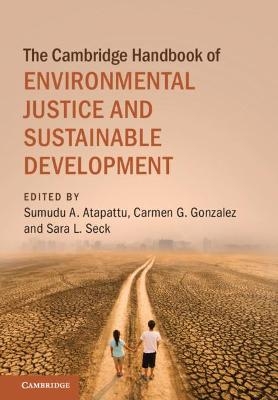
The Cambridge Handbook of Environmental Justice and Sustainable Development
Cambridge University Press (Verlag)
978-1-108-47000-1 (ISBN)
Despite the global endorsement of the Sustainable Development Goals, environmental justice struggles are growing all over the world. These struggles are not isolated injustices, but symptoms of interlocking forms of oppression that privilege the few while inflicting misery on the many and threatening ecological collapse. This handbook offers critical perspectives on the multi-dimensional, intersectional nature of environmental injustice and the cross-cutting forms of oppression that unite and divide these struggles, including gender, race, poverty, and indigeneity. The work sheds new light on the often-neglected social dimension of sustainability and its relationship to human rights and environmental justice. Using a variety of legal frameworks and case studies from around the world, this volume illustrates the importance of overcoming the fragmentation of these legal frameworks and social movements in order to develop holistic solutions that promote justice and protect the planet's ecosystems at a time of intensifying economic and ecological crisis.
Sumudu Atapattu is Director of Research Centers and International Programs at University of Wisconsin Law School and Executive Director of the Human Rights Program. She is affiliated faculty with Raoul Wallenberg Institute for Human Rights, Sweden and lead counsel for human rights at Center for International Sustainable Development Law, Canada. Carmen G. Gonzalez recently joined the faculty of Loyola University Chicago School of Law as the Morris I. Leibman Professor of Law after many years at Seattle University School of Law. She has published widely on international environmental law, human rights and the environment, and environmental justice. Professor Gonzalez has served as the chair of Environmental Law Section of the Association of American Law Schools and as member and deputy chair of the Governing Board of the IUCN Academy of Environmental Law. She is currently a member of Board of Trustees of Earthjustice, the largest public interest environmental law firm in the United States. Sara L. Seck is an Associate Professor with the Schulich School of Law and Marine and Environmental Law Institute, Dalhousie University. In 2015, she received the IUCN Academy of Environmental Law's Emerging Scholarship Award. She is a director with the Global Network for the study of Human Rights and Environment.
Foreword by Boaventura de Sousa Santos; 1. Intersections of environmental justice and sustainable development: framing the issues Sumudu Atapattu, Carmen G. Gonzalez and Sara L. Seck; Part I. Frameworks: 2. The indivisibility of human dignity and sustainability Erin Daly and James R May; 3. Environmental justice in the global south Usha Natarajan; 4. Indigenous environmental justice and sustainability Deborah McGregor; 5. Racial capitalism and the anthropocene Carmen G Gonzalez; 6. Human rights and socio-ecological justice through a vulnerability lens Louis J K-otzé; 7. Social-ecological resilience and its relation to the social pillar of sustainable development Barbara Cosens; 8. Environmental justice and sustainability: the United States experience Robin Morris Collin and Robert W. Collin; Part II. Case studies; strategies, challenges and vulnerable groups: 9. The role of public interest litigation in realizing environmental justice in South Asia: selected cases as guidance in implementing agenda 2030 Shyami Puvimanasinghe; 10. Children's rights or intergenerational equity? exploring children's place in environmental justice Mona Paré; 11. Managing water as life in Guatemala: lessons on environmental justice from Totonicapán Patrícia Galvão Ferreira and Mario Mancilla; 12. Indigenous ancestors. Recognizing legal personality of nature as a reconciliation strategy for connective sustainable governance Jacinta Ruru; 13. Water justice and the social pillar of sustainable development: the case of Israel Tamar Meshel; 14. Gender, indigeneity, and the search for environmental justice in post-colonial Africa Damilola S Olawuyi; 15. Colombo international financial city: an example of un-sustainability and in-justice Lakshman Guruswamy, Joshua C Gellers and Sumudu Atapattu; 16. Chemical pollution and the role of international law in a future detoxified Sabaa Ahmed Khan; 17. China's cancer villages Quoc Nguyen, Linda Tsang, Tseming Yang; 18. Colonialism, environmental injustice, and sustainable development: nuclear testing in the Marshall Islands Antonio Pigrau; 19.The Vedanta (Niyamgiri) case: promoting environmental justice and sustainable development Stellina Jolly; 20. De marginalizing the intersection of ecological and social disadvantage in South Africa: a critique of current approaches to dealing with historical injustice – the Tudor shaft case study Jackie Dugard; 21. Sustainable mining, environmental justice, and the human rights of women and girls: Canada as home and host state Sara L Seck and Penelope Simons; 22. Environmental justice, sustainable development and the fight to shut the Poletti power plant Rebecca M Bratspies; 23. The indigeneity of environmental justice: a Dakota access pipeline case study Elizabeth Kronk Warner; 24. Energy poverty, justice and women Lakshman Guruswamy; 25. 'Energy without injustice'? indigenous participation in renewable energy generation Adrian A Smith and Dayna Nadine Scott; 26. Climate justice and the social pillar in California's climate policies Alice Kaswan; 27. Climate change-related eco-health considerations for environmental impact assessments in the Canadian Arctic Katherine Lofts and Kontantia Koutouki; 28. Climate justice, sustainable development and small island states: A case study of the Maldives Sumudu Atapattu and Andrea C. Simonelli; Part III. Conclusion: 29. Afterword: toward a law and political economy approach to environmental justice Angela P Harris; 30. Beyond fragmentation: reflections, strategies and challenges Sumudu Atapattu, Carmen Gonzalez and Sara L. Seck.
| Erscheinungsdatum | 23.03.2021 |
|---|---|
| Reihe/Serie | Cambridge Law Handbooks |
| Zusatzinfo | Worked examples or Exercises |
| Verlagsort | Cambridge |
| Sprache | englisch |
| Maße | 260 x 180 mm |
| Gewicht | 1210 g |
| Themenwelt | Recht / Steuern ► EU / Internationales Recht |
| Recht / Steuern ► Öffentliches Recht ► Umweltrecht | |
| Recht / Steuern ► Öffentliches Recht ► Völkerrecht | |
| Wirtschaft ► Volkswirtschaftslehre | |
| ISBN-10 | 1-108-47000-9 / 1108470009 |
| ISBN-13 | 978-1-108-47000-1 / 9781108470001 |
| Zustand | Neuware |
| Haben Sie eine Frage zum Produkt? |
aus dem Bereich


